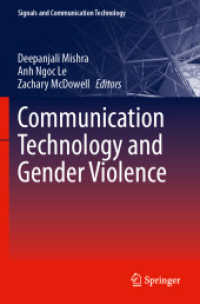- ホーム
- > 洋書
- > 英文書
- > Science / Mathematics
Full Description
By addressing the enigma of the exceptional success of Hungarian emigrant scientists and telling their life stories, Brilliance in Exile combines scholarly analysis with fascinating portrayals of uncommon personalities. István and Balazs Hargittai discuss the conditions that led to five different waves of emigration of scientists from the early twentieth century to the present. Although these exodes were driven by a broad variety of personal motivations, the attraction of an open society with inclusiveness, tolerance, and - needless to say - better circumstances for working and living, was the chief force drawing them abroad.
While emigration from East to West is a general phenomenon, this book explains why and how the emigration of Hungarian scientists is distinctive. The high number of Nobel Prizes among this group is only one indicator. Multicultural tolerance, a quickly emerging, considerably Jewish, urban middle class, and a very effective secondary school system were positive legacies of the Austro-Hungarian Monarchy. Multiple generations, shaped by these conditions, suffered from the increasingly exclusionist, intolerant, antisemitic, and economically stagnating environment, and chose to go elsewhere. "I would rather have roots than wings, but if I cannot have roots, I shall use wings," explained Leo Szilard, one of the fathers of the Atom Bomb.
Contents
Foreword
Ivan T. Berend
Introduction
Preface
Joseph A. Galamb
Philipp Lenard
PART I. Early 1920s
Introduction: Fleeing
Ervin Bauer
Stephen Brunauer
Ladislaus Farkas
Dennis Gabor
George de Hevesy
Theodore von Kármán
Arthur Koestler
Stephen W. Kuffler
Nicholas Kurti
Cornelius Lanczos
John von Neumann
Egon Orowan
Michael Polanyi
George Pólya
Elizabeth Rona
Leo Szilard
Maria Telkes
Edward Teller
Eugene P. Wigner
"Control" - Imre Bródy
PART II. Late 1930s - Early 1940s
Introduction: Before It Is Too Late
Michael and Alice Balint
Ladislao José Biro
Paul Erdos
John G. Kemeny
Olga Kennard
Peter D. Lax
George J. Popjak
Valentine L. Telegdi
Laszlo Tisza
Part III. Immediate Post-World War II
Introduction: Post-War and Pre-Soviet Trauma,
Endre A. Balazs
Zoltan Bay
Georg von Békésy
Lars Ernster
John C. Harsanyi
Avram Hershko
Georg and Eva Klein
Albert Szent-Györgyi
Part IV. 1956
Introduction: In the Wake of Suppressed Revolution
Laszlo Z. Bito
Andy Grove
Peter Lengyel
Joseph Nagyvary
George A. Olah
Gabor A. Somorjai
Part V. 1957‒1989
Introduction: Escape from "Paradise"
Gyorgy Buzsaki
Gabor Fodor
Katalin Karikó
Charles Simonyi
Agnes Ullmann
"Control"—Árpád Furka
Conclusion
Thirty Years Later, and Continuing
Acknowledgments
Bibliography
Index of Names







